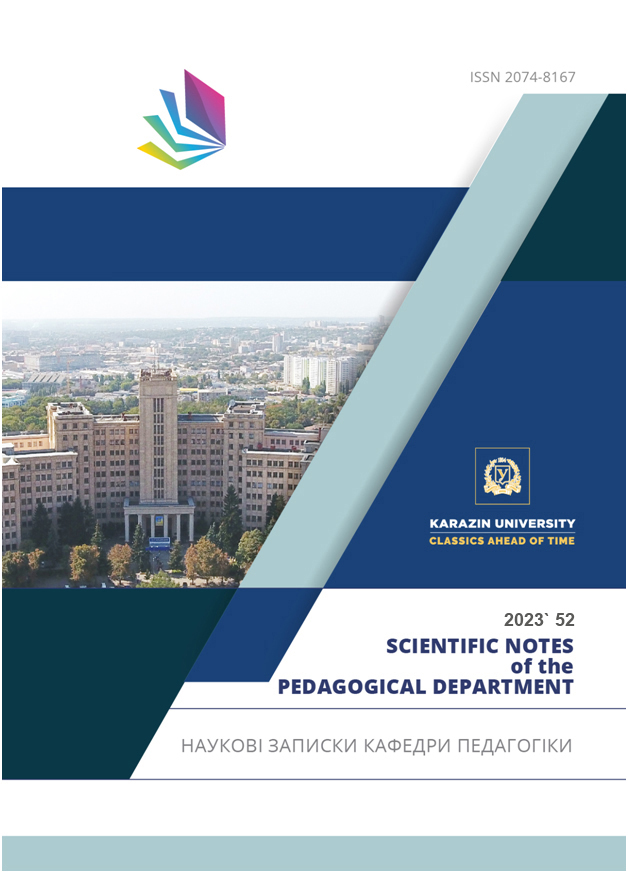Development of intellectual abilities of preschool children by means of STEM education
Abstract
The article is devoted to the study of the concept of intellectual abilities of preschool children. It is determined that intellectual development is understood as a set of quantitative and qualitative changes that occur in the cognitive mental processes of a child under the influence of the child’s environment and own experience. The core of intellectual development is mental abilities. It is emphasized that the devel- opment of intellectual abilities occurs in various types of preschoolers’ activities: play, construction, and learning activities.
The influence of STEM education on the development of preschool children’s intellectual abilities is investigated. It is proved that the use of STEM education contributes to the creation of a model of educational environment for the development of prerequisites for scientific and technical creativity and intellectual activity of preschoolers, variability of the content of the educational process in the group, which makes it possible to take initiative and independence in various activities.
To achieve this goal, such research methods as analysis and generalization of philosophical and psychological-pedagogical literature, state documents on preschool education were used to determine the terminological field of the study. The classification and generalization of existing practical developments and own pedagogical experience in the implementaƟon of STEM education in the educational process of preschool education institutions are applied.
Effective methods and means for the development of students’ intellectual abilities are substantiated: robotics, construction, mental arithmetic, logical tasks, experiments, research, etc. It has been established that STEM educaƟon has a positive impact on the development of a child’s cognitive processes: perception, memory, thinking, speech, imagination. The need to create appropriate curricula, laboratories, and centers for the development of STEM skills in preschoolers is emphasized.
Downloads
References
Antonova, O., Antonov, O. & Polishchuk, N. (2022). STEM approach in education and teacher training for its implementation. Bulletin of Zhytomyr Ivan Franko State University. Pedagogical sciences. (110), 267-281. [in Ukrainian].
Baditsa, M. & Pitsyk, S. (2020). Development of intellectual abilities of senior preschoolers with the help of LEGO construction sets. Achievements and prospects of modern scientific research. Abstracts of the 1st International scientific and practical conference. Editorial EDULCP. Buenos Aires, Argentina. P. 21-27. [in Ukrainian].
Basic component o fpreschool education.StandardUkraine. (2021).Retrieved fromhttps://mon.gov.ua/storage/ app/media/rizne/2021/12.01/Pro_novu_redaktsiyu%20Bazovoho%20komponenta%20doshkilnoyi%20 osvity.pdf [in Ukrainian].
Vasilieva, L. (2020). Using Dienes logic blocks for intellectual development of preschoolers. Work experience of a preschool teacher: traditional approaches and innovations: materials of the All-Ukrainian Scientiϔic and Practical Conference (Uzhhorod, May 19, 2020). Uzhgorod: Center for Progressive Education “Genezum”. Part II, Р. 420. [in Ukrainian].
Voloshchuk, I. (2023). Intelligence development: Ariadne’s thread not found. Education and development of a gifted personality. V.10. Р.13-17. [in Ukrainian].
Voloshchenko, O. & Koval, Y. (2019). Educational and developmental potential of lego technologies in the development of cognitive activity of children of senior preschool age. Educational discourse: collection of scientific works. № 11 (3). Retrieved from https://enpuir.npu.edu.ua/bitstream/handle/123456789/24512/ Voloschenko.pdf?sequence=1 [in Ukrainian].
Hazina, I. (2017). Development of Intellectual Abilities in Preschool Children by Means of Pedagogical Innovations by V. Voskobovych. Preschool education in the modern sociocultural space: coll. of science works Poltava: Publisher Shevchenko R., Vol. 1. Р. 53–59. [in Ukrainian].
Dotsenko, S., Havrysh, I. & Shcherbakova, O. (2017). STEM-education as a means of enhancing the creative potential of the individual within the framework of the scientiϐic and pedagogical project «Intellect of Ukraine». Perspectives of research and development: сollection of scientific articles. Dublin. Ireland. P. 119-125. [in Ukrainian].
Dotsenko, S. (2021). STEM education: scientific discourse and educational practices. Native school. № 3, Р.31-35. [in Ukrainian].
Kant, I. (2000). A critique of pure reason. Kyiv. Universe, 504 s. [in Ukrainian].
Standard Ukraine. The concept of development of science and mathematics education (STEM education) (2020).
Retrieved from https://zakon.rada.gov.ua/laws/show/960-2020-%D1%80#n8 [in Ukrainian].
Moliako, V. (2008). Methodological and Theoretical Problems of the Study of Creative Activity. Strategies of creative activity: school of V. O. Molyako. Kyiv: Education of Ukraine. 702 s. [in Ukrainian].
Morze, N., Strutynska, O. & Umryk, M. (2018). Educational robotics as a promising area of STEM education development. Electronic scientiϔic publication “Open educational e-environment of a modern university». (5), S. 178-187. [in Ukrainian].
Panhelova, N. (2014). Theoretical and methodological bases of formation of harmoniously developed personality of preschool child in the process of physical education. Kyiv: National University of Physical Education and Sports of Ukraine. [in Ukrainian].
Pidlypniak, I. & Duka, T. (2020). Intellectual Development of Preschool Children in the Conditions of Modern
Preschool Education Institution. Scientific journal of the M.P. Drahomanov NPU. Р.40-43. [in Ukrainian].
Rybalko, A., Rybalko, O. & Zakharchuk, O. STEM-research of schoolchildren in instrumentation. Collection of research papers kamianets-podilskyi national. Retrieved from https://mvf.kpnu.edu.ua/wp-content/ uploads/2023/02/zbirnik-28_2022.pdf#page=19 [in Ukrainian].
Roma, O., Blyzniuk, V. & Boruk, O. (2016). Program for the development of children from 2 to 6 years old and methodological recommendations “The boundless world of play with LEGO». The LEGO® Foundation.140 c. [in Ukrainian].
Ulkina, T. (2005). Prohrama z dystsypliny “Dytiacha psykhodiahnostyka”. Practical psychology: Complex of typical educational programs K.: NPU named after M.P. Drahomanova, LLC «Osnova». V.2. Р. 93 - 97. [in Ukrainian].
Khutorna, N. & Sanduhei, V. (2021). Experimental study of the development of intellectual abilities of senior preschool children by means of mental arithmetic. Trends in the development of preschool and primary education: youth and science: a collection of theses of the 2nd All-Ukrainian scientiϔic and practical conference with international participation. Part 2. Kyiv. NPU named after M.P. Drahomanova, 2021. 379 s., pp. 223-225. [in Ukrainian].
Shysh, Y. (2014). Peculiarities of mental abilities of older preschoolers. Retrieved from https://nauka-online. com/wp-content/uploads/2021/09/SHish.pdf [in Ukrainian].
Gardner Howard. (1983). Frames of Mind: The Theory of Multiple Intelligences New York : Harper and Row,.
p. Retrieved from https://www.amazon.com/Frames-Mind-Theory-MultipleIntelligences. [in English].
Heckman, J. (2006). Skill formation and the economic of investing in disadvantaged children. Science. 312 (6).
-1902.
Xenia Naidenova. J. (2001). Piaget’s theory of intelligence: Operational aspect. Retrieved from https://www. researchgate.net/publication/266274565_J_Piaget’s_theory_of_intelligence_Operational_aspect.

